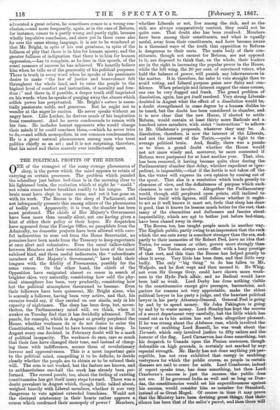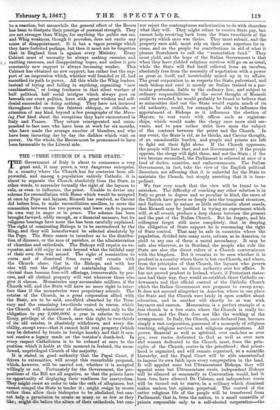THE POLITICAL PROFITS OF THE RECESS.
ONE of the strangest of the many strange phenomena of sleep, is the power which the mind appears to retain of carrying on certain processes. The problem which puzzled the schoolboy just before bed-time is in the morning clear to his lightened brain, the recitation which at night he " could " not retain comes before breakfast readily to his tongue. The brain must have slept in some sense, and yet it has gone on with its work. The Recess is the sleep of Parliament, and not infrequently presents this among others of the phenomena of bodily rest. Apparently, it is true, the slumber has been most profound. The chiefs of Her Majesty's Government have been more than usually silent, not one having given a hint of either their policy or their hopes. No despatches have appeared from the Foreign Office, no pamphlets from the Admiralty, no domestic projects have been allowed with care- ful indiscretion to ooze out from the Home Secretariat, no promises have been made from the Treasury to keep expectants at once alert and submissive. Even the usual talkee-talkee between Members and their constituents has been of the most subdued kind, and those useful indiscreets, the " subordinate members of Her Majesty's Government," have held their tongues with the fidelity of Freemasons, possibly for the same reason. On the other hand, the chiefs of the Opposition have emigrated almost en masse in search of brighter skies, very naturally, considering how cold the phy- sical atmosphere has been, very prudently, considering how hot the political atmosphere threatened to become. Even their followers have been quiescent, Mr. Bright alone, who is scarcely a follower, having been very active, and that, his enemies would say, if they carried on our simile, only in his capacity of nightmare. The sleep has been deep, but, never- theless, the Parliamentary mind will, we think, when it awakes on Tuesday find that it has decidedly advanced. That puzzle, for example, which in August so greatly perplexed the House, whether workmen do or do not desire to enter the Constitution, will be found to have become clear in sleep. In August every one doubted, in February doubt will be a mark of political incapacity. The workmen do care, care so much that their foes have changed their tone, and instead of charg- ing them with indifference, accuse them of revolutionary fervour and oppressiveness. This is a most important gain to the political mind, compelling it to be definite, to decide clearly whether the people are to obtain or to be refused their will. The sum is not worked, but the factors are known, and to arithmeticians one-half the work has already been per- formed. The second puzzle, too, about the feeling of existing constituencies has got itself many steps forward. There was a doubt prevalent in August which, though little talked about, weighed heavily with Liberal members, whether it was very dangerous to vote against extended franchises. Would not the electoral aristocracy in their hearts rather approve a course which confirmed their monopoly of power Members, whether Liberals or not, live among the rich, and as the rich are always comparatively content, they could not be quite sure. That doubt also has been resolved. Members.
have been among their constituents, and what is equally useful, away from their constituents, and have become aware- in a thousand ways of the truth that opposition to Reform is dangerous to their seats. The main body of their con- stituents, though not earnest for Reform, are not opposed to it, are disposed to think that, on the whole, their leaders.
are in the right in increasing the popular power in the House, while the left wing, the 20 per cent. of convinced voters, who hold the balance of power, will punish any lukewarmness in the matter. It is, therefore, far safer to vote straight than to avoid voting, and Liberal purpose gains new fixity and con- fidence. When principle and interest suggest the same course, one can be very dogged and frank. The grand problem of dissolution, again, has got itself resolved. Very strong Liberals-- doubted in August what the effect of a dissolution would be, a doubt strengthened in some degree by a human dislike to..
be taxed, but the doubt has been considered in slumber, and it is now clear that the new House, if elected to settle Reform, would contain at least thirty more Radicals and a. hundred more members, with strict "instructions" to adhere to Mr. Gladstone's proposals, whatever they may be. A_ dissolution, therefore, is now the interest of the Liberals, and not the interest of the Tories,—quite a light to the average political brain. And, finally, there was a puzzle-. as to time, a grand doubt whether the House would not act more wisely and, moreover, be more contented if: Reform were postponed for at least another year. • That, also, has been removed, it having become quite clear during the- Parliamentary slumber that delay, whether expedient or inex- pedient, is impossible,—that if the kettle is not taken off 4the-, fire, the water will express its own opinion by coming out of the spout. That also is a resolution which tends greatly to-, clearness of view, and the definiteness of purpose which suck clearness is sure to involve. Altogether the Parliamentary world, though still perplexed upon points, still inclined to- bewilder itself with figures, still dubious whether it ought.- to act as it well knows it must act, feels that sleep has done• it good, that it knows its lessons much better for the rest, that many of the obscurities and dullnesses and fancies about impossibility, which are apt to bother just before bed-time,. have been chased away in sleep.
The Recess, too, has taught people much in another way._ The English public, partly owing to an impression that the rock which the sea eats away is somehow stronger than the sea, and partly to their memories of Sir Robert Peel, have an idea that Tories, for some reason or other, govern more strongly than Whigs. The Tories always enter office with a hazy prestige of that sort, and this time the Recess has helped greatly to clear it away. Very little has been done, and that little very badly. The only "big thing" to do has fallen to Mr.. Walpole, and he first wept and then messed it. No Whig, not even Sir George Grey, could have shown more weak- ness in the Hyde Park affair, and no Radical would have been half as weak. Lord Derby has done nothing visible- to the constituencies except give peerages, baronetcies, and garters for reasons not very appreciable, make the ablest• political lawyer in his party a judge, and the heaviest political_ lawyer in his party Attorney-General. General Peel is going by and by to spend money. Sir John Pakington is going: by and by to waste money. Lord Stanley has kept the secrets- of a secret department very carefully, but the little which has.
oozed out as to his action has not been altogether pleasant._ If he was strong about the Alabama case, which involved the luxury of snubbing Lord Russell, he was weak about the Tornado, which only involved justice to fifty sailors and the of the flag. Lord Carnarvon has done something, but his despatch to Canada upon the Fenian sentences, though defensible on high grounds, is certainly not marked by any especial strength. Mr. Hardy has not done anything yet per- ceptible, has not even exhibited that energy in snubbing vestrymen for which the public craves, as people in certain diseases are said to crave for acids. Lord Cranborne, indeed - if report speaks true, has done something, but then Lord, Oranborne's success is just the success. the public does not see. If he governed India as well and as long as Dun- das, the constituencies would set his superciliousness against his success, would consider him as member for Stamford, instead of as Great Mogul. Of course in time it may prove that the Ministry have been devising great things, that their silence has been that of the sailor's parrot, and then there will be a reaction, but meanwhile the general effect of the Recess has been to dissipate their prestige of personal strength. They are not stronger than Whigs, for anything the public can see, and Whig weakness, though it provokes, does not excite any sense of disappointment. It is but a vague prestige which they have forfeited perhaps, but then it must not be forgotten that in England time is against every Ministry. Every Cabinet must of necessity be always making enemies, and exciting rancours, and disappointing hopes, and unless it gets constantly new support is always becoming weaker. This Cabinet has obtained no new support, has rather lost the sup- port of an impression which, whether well founded or ill, had smoothed its path to power. All this while the Whig leaders, instead of trying and failing in anything, organizing " new combinations," or losing freshness in that silent warfare of half political, half social intrigue which always goes on beneath our overt politics, have with great wisdom and self- denial succeeded in doing nothing. They have not incurred throughout the recess the faintest obloquy, or ridicule, or attention of any kind, beyond a few paragraphs of the Morn- ing Post kind about the receptions they have encountered in Italy and France. They return reinvigorated and unim- peached to face men who have been at work for six months, who have made the average number of blunders, and who have been incurring day by day the dislikes which wait on power. On the whole, the Recess must be pronounced to have been favourable to the Liberal side.



































 Previous page
Previous page